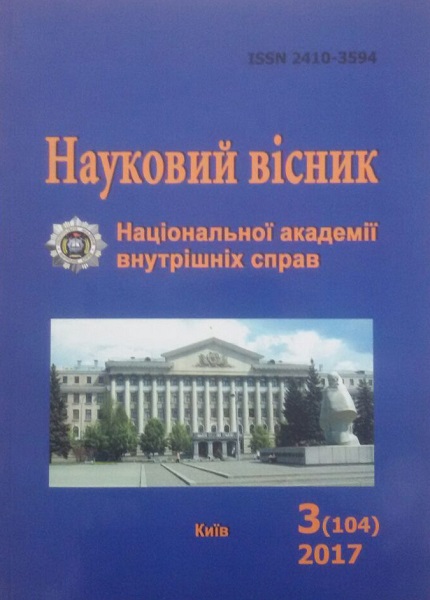Roles and Responsibilities of Specialists and Experts in Investigating and Prosecuting Crimes
Abstract
In this article the author reveals the significant role and duties of
specialists and experts in investigating and prosecuting crimes.
According to the Criminal Procedure Law of Ukraine, a specialist in
criminal proceedings shall be a person who has special knowledge
and skills necessary to use technical or other devices and who is
able to consult during pre-trial investigation and trial on issues which
require special knowledge and skills. Specialist may be committed –
by parties during pre-trial investigation and by court during trial – to
directly provide technical assistance (photographing, drawing
schemes, plans, drawings, taking samples for expert examination,
etc). The author depicts an expert in criminal proceedings as an
individual who has scientific, technical or any other special expertise,
has the right under the Law of Ukraine «On Forensic Examination»,
to conduct expert examination and who is assigned to examine
objects, events and processes that contain information on
circumstances under which a criminal offence was committed, and to
provide an opinion on issues arising in the course of criminal
proceedings and relating to the sphere of his knowledge. The author
infers that the persons who are dependant, officially or otherwise, on
parties in criminal proceedings, on the victim, may not be experts.
The clear distinction is established between the two notions of a
specialist and an expert. Previously the duties of a specialist and an
expert were performed by one specialist; nowadays these duties are
vested in two different specialists. Nevertheless there are some
specific tasks which are assigned for both specialists at the same
time. The author stresses that mutual collaboration of both
specialists and experts is aimed at enhancing law enforcement
activities in Ukraine.
The main responsibilities of both specialists and experts are
compared and contrasted. The specialist shall not be required to
appear when summoned by the investigator, prosecutor or court and
have with him/her technical equipment, devices, and appliances.
If a specialist does not appear before court without valid reasons or
fails to notify the reasons for his/her non-appearance, all costs
related to the adjournment of court session shall be imposed by court
on the specialist concerned. According to the author’s observations
there are explicit contradictions between the rights and
responsibilities imposed on their jobs by the law.
Other factors that affect the quality of experts’ work are
identified. Namely: gathering material that leads to the detection of a
crime is carried out only at the initial stage of the investigation
(examining the scene of the crime), short-term reforming of the law
enforcement system reflect very low level of specialists and causes
incomplete regulation of law enforcement activities.
Downloads
Abstract views: 87 PDF Downloads: 57
- Authors reserve the right to authorship of their own work and transfer to the magazine the right of the first publication of this work under the terms of the Creative Commons Attribution License, which allows other persons to freely distribute published work with mandatory reference to authors of the original work and the first publication of an article in this magazine.
- Authors have the right to enter into separate additional agreements on non-exclusive dissemination of the work in the form in which it was published in the journal (for example, to post an article in the institution's repository or to publish as part of a monograph), provided that the link to the first publication of the work in this journal is maintained.
- The journal's policy allows and encourages the posting of articles by authors on the Internet (for example, in electronic storehouses of institutions or on personal websites), both before the submission of this manuscript to the editorial office and during its editorial processing, as this contributes to the creation of a productive scientific discussion and positively affects the efficiency and dynamics of citing the published work.




